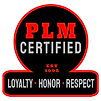Baba Chawki Irving, All African People’s Revolutionary Party (A-APRP), introduced African Liberation Day (ALD) to the crowd of supporters gathered in Lafayette Square Park on the afternoon of Saturday, May 25. African Liberation Day, known in some parts of the world simply as Africa Day, not only marks the 61st anniversary of the founding of the Organization of African Unity (OAU) on May 25, 1963, it has also served as a clarion call to Pan Afrikan activists and organizers around the world to continue to organize our communities and resist injustice and oppression wherever 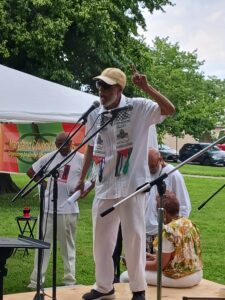 it continues to impact Afrikan people and People of Afrikan Descent in Afrika and around the world. The Maryland Council of Elders (MCOE), founded in Baltimore in December 2017, in cooperation with veteran community activist Baba Charlie Dugger, has sponsored African Liberation Day observances in Lafayette Square Park since 2019, each time embodying a specific theme to exhort organizers, activists and the general Pan Afrikan community to continue, indeed to intensify, our organizing and resistance activities.
it continues to impact Afrikan people and People of Afrikan Descent in Afrika and around the world. The Maryland Council of Elders (MCOE), founded in Baltimore in December 2017, in cooperation with veteran community activist Baba Charlie Dugger, has sponsored African Liberation Day observances in Lafayette Square Park since 2019, each time embodying a specific theme to exhort organizers, activists and the general Pan Afrikan community to continue, indeed to intensify, our organizing and resistance activities.
Baba Chawki explained the focus of this year’s observance. “This African Liberation Day has a theme. That theme is ‘Same Struggle: Smash Zionism in Occupied Palestine, the Americas, Africa and Oceania’. … The All African Peoples Revolutionary Party, if you don’t know anything about it … our objective is one unified socialist Afrika. The United States of Afrika. Marcus Garvey said, in a book called The Philosophy and Opinions of Marcus Garvey, he made a statement that caused me to join the All African Peoples Revolutionary Party. … He used the word ‘race’. A race without power and authority is a race without respect.”
This year’s observance featured a long list of organizers, speakers and performers, sharing information, analysis, food, poetry and music for a full day of uplifting Pan Afrikan culture for all ages.
Baba Senghor Baye, of the Universal Negro Improvement Association and African Communities League Rehabilitating Committee 2020 (UNIA-ACL RC2020), was one of the early speakers.
“Marcus Garvey warned us, [Jean-Jacques] Dessalines warned us, and it goes all the way back to Ancient KMT (Kemet, what modern historians now call ‘Egypt’ — Editor), when we had peace and harmony on the planet. Then Yurugu (European conquerors — Editor) came on the scene, which is our lost-soul children, you hear me? All humanity comes from Afrika. Afrika must be free. No Afrikan anywhere on the planet will have justice and freedom until we free Mother Afrika. But it ain’t about me, he or she, it’s about we, collectivity. If you really overstand, you will check your Blacktricity and get involved with the synchronicity of the revolution that is taking place. Despite the monopoly capitalism that you see happening all around the world. Despite what you’re looking at on your ‘boob tube’. I want you to know that the Garvey Movement, along with other movements that are sincere, are building not only in Afrika but all over the world. Don’t listen to me, check yourself out, because if you don’t know yourself, you will miss the revolution.
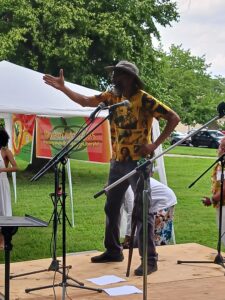 “Marcus Garvey warned us, Amy Jacques Garvey warned us, Dessalines warned us, our Ancestors are waiting and watching, children are still crying and dying, because we, the people that are still here, are too apathetic to understand the real reason why we were born in the first place. [We think] that you’re born to die. But remember, in the Afrikan tradition, you never die if you are an Afrikan. You move to the next level of life, which is called the Ancestral Realm. And our Ancestors are very much alive. Make no mistake, because you will be punished of you do not find out who you are in the next realm. Now, I’m not here to glorify you with a speech, but I’m here to warn you. The time is now. The majority of youth in the world are on the Afrikan Continent. The next continent is South America. So y’all folks in North America need to get your act together and overstand, Brothers are waiting that speak Portuguese, that speak French, that speak Spanish, that speak all kinds of Afrikan dialects. And believe me, what you see happening in the Sahel (with the recently-established Alliance of Sahel States between Niger, Mali and Burkina Faso — Editor) is the beginning of us coming together.
“Marcus Garvey warned us, Amy Jacques Garvey warned us, Dessalines warned us, our Ancestors are waiting and watching, children are still crying and dying, because we, the people that are still here, are too apathetic to understand the real reason why we were born in the first place. [We think] that you’re born to die. But remember, in the Afrikan tradition, you never die if you are an Afrikan. You move to the next level of life, which is called the Ancestral Realm. And our Ancestors are very much alive. Make no mistake, because you will be punished of you do not find out who you are in the next realm. Now, I’m not here to glorify you with a speech, but I’m here to warn you. The time is now. The majority of youth in the world are on the Afrikan Continent. The next continent is South America. So y’all folks in North America need to get your act together and overstand, Brothers are waiting that speak Portuguese, that speak French, that speak Spanish, that speak all kinds of Afrikan dialects. And believe me, what you see happening in the Sahel (with the recently-established Alliance of Sahel States between Niger, Mali and Burkina Faso — Editor) is the beginning of us coming together.
“People talk about ‘Marcus Garvey never went to Afrika’, but I want you to know, we’re in Ghana, we’re in Sierra Leone, we’re in Guinea, we’re in Burkina Faso, we’re in Kenya, and we’re going to end up being everywhere. Because you know what? We’ve been supportive of the All African Peoples Revolutionary Party since its inception in the United States of Snakes. But in 1957, the President-General was with Kwame Nkrumah in Afrika. Many of you don’t know because you’re reading the wrong story. You need to read the story [of] Brothers like Runoko Rashidi, Tony Martin, there’s so many others, Dr. [John Henrik] Clarke, Dr. Ben [Yosef Ben-Jochannon], they all have done the research, but we’ve still got people like Tony Browder, still doing the work. We’ve still got Marimba Ani. Let the circle be unbroken.
“I want you to know, we are winning. It might look like we’re not, but we’re winning. That is why Yurugu is fighting each other all over the world. That is why they’re in Palestine, killing all our Brothers and Sisters, but never forget the Congo. I say never forget the Congo. Because once we run out all the capitalists in the Congo, the Congo has enough land, enough resources to feed the whole planet. But we’re not just talking about Central Afrika or the Congo. We’re talking about Baltimore, Tubman City. We’re talking about Banneker City, Washington DC. We’re talking about Chicago. The saying Kwame Ture always told us, ‘Organize! Organize! Organize!’
“But do not think that if you’re in one organization, that you have completed the organizing efforts that are required. Also, you’ve got the Pan African Federalist Movement, you’ve got the Nubian Leadership Circle, you have the UNIA-ACL Rehabilitating Committee 2020, which I serve today as the First Assistant President-General. I served eight years as the President-General [of the parent UNIA-ACL–Editor] following the works of Marcus Garvey, but as I say, it ain’t about me, he or she, it’s about we, collectivity. Check out yourself, raise up yourself, don’t be discouraged if you don’t see the multitude of the people, but I can remember when ALD at Malcolm X Park in Washington DC [was] loaded with thousands upon thousands upon thousands of people. But we’ve been hoodwinked. We’ve been hoodwinked and tricked. So be very, very aware, Brothers and Sisters, that the majority of Afrikan youth are looking for organized people who are conscious to give them the proper direction. Self-reliance. We talk about reparations. We’re demanding reparations. But I want you all to know we exonerate Garvey, and we’re about repairing our own selves. So, whether or not they open the door to give us back what belongs to us, we’re going to knock down the door and take it back. That is what real revolution is all about.
“So, as I close, I want to remind you, never be content with the food of chickens. It’s time for Afrikans to rise up to their traditional greatness. … So let’s hook up with one another, meet somebody, greet somebody, join an organization, get organized, and meet us at the work table. Afrika must unite. One God, one aim, one destiny. One Afrika!”
Sista Free, host of radio’s Ghana Café, sang several songs including “One Note Samba”, “Harvest For The World” and “What A Wonderful World”.
Baba Paul Pumphrey of Friends of the Congo spoke about the historic and continuing injustice being visited upon what has been referred to as “the jewel of Afrika” and “Afrika’s breadbasket”, the nation once known as Zaire and now known as the Democratic Republic of Congo (DRC).
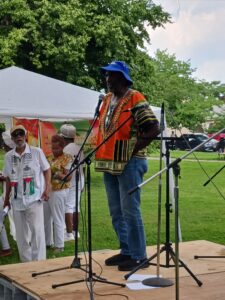 “Back in 2004, I got together with two other friends because we saw a need here in the US as well as around the world, and that was exposing what is going on in the Democratic Republic of the Congo. I’d like to start off by giving a few facts. The Congo is in the center of the Continent of Afrika, the equator runs straight through the middle of the Congo, it is the second largest land mass in the Continent of Afrika, it has a mineral wealth of over 22 trillion dollars, and if those minerals were refined in the Congo, it would be worth well over 400 trillion dollars. But not only that, it has the second largest rain forest in the world, and the Congolese River is the second largest and most powerful river in the world, only second to the Amazon. What does that mean? That if you capture the power of the Congolese River with hydroelectric dams, you could produce enough electricity for the Continent of Afrika for the next 30 years. Think about that, and what that would do for the economies of Afrika.
“Back in 2004, I got together with two other friends because we saw a need here in the US as well as around the world, and that was exposing what is going on in the Democratic Republic of the Congo. I’d like to start off by giving a few facts. The Congo is in the center of the Continent of Afrika, the equator runs straight through the middle of the Congo, it is the second largest land mass in the Continent of Afrika, it has a mineral wealth of over 22 trillion dollars, and if those minerals were refined in the Congo, it would be worth well over 400 trillion dollars. But not only that, it has the second largest rain forest in the world, and the Congolese River is the second largest and most powerful river in the world, only second to the Amazon. What does that mean? That if you capture the power of the Congolese River with hydroelectric dams, you could produce enough electricity for the Continent of Afrika for the next 30 years. Think about that, and what that would do for the economies of Afrika.
“Yet, the United States has been involved in keeping the Congo colonized. What do I mean by that? When the Congo won its independence from Belgium in 1960, and they had an election, they chose a new Prime Minister by the name of Patrice Lumumba. And the United States allowed Lumumba to live for about six months after his election, after he came into power, simply because he asked that his country be allowed for the people of his country to take advantage of some of the wealth that the country had. And the United States, and Belgium and Great Britain and the NATO nations said ‘Hell, no, the wealth of Afrika belongs to them, not to Afrikan people’.
“And this is where we are today when we say that we need to stand up and say ‘No More’. We need to say that the United States needs to stop spending billions of dollars supplying weapons and logistical support to the armies of Uganda and Rwanda and clearing people off of land in the eastern part of the Congo so that mining companies can go and steal the minerals. … The UN wrote a report, back around 2010, that stated from the year of 1996 to 2006, that six million Congolese were killed just in the area where those minerals were located. And one asks ‘Why?’ It’s simple. The mining companies knew that it’s kind of hard to ask for the rights to mine on some land where there’s a village sitting on top of it. So they brought the armies across the river from Uganda and Rwanda, and they slaughtered the people. At the same time, another tactic they used to discourage people from being on that land was they brutally raped women and girls. … And you end up having hostels specifically set up to do one thing, and that was to try to repair these women … that’s how brutal they were. And the point we need to be clear about is this is being done with US tax dollars.
“People wonder why the cost of going to college is high. People wonder why we don’t have money for affordable housing. People wonder why we don’t have money for national health insurance. The answer is simple. The US government, both Democrats and Republican Party, is sending that money to carry out war. In the Congo. In Gaza. In many other parts of this world. For one simple reason: because they want to rob them. And it’s left up for us here in this country to demand that the politicians of this country either change their policy or look for another job. A lot of times, people sit back and they say ‘Oh well, I have this Black politician that’s from my district.’ What is that politician’s position on Rwanda and the United States supplying weapons to Rwanda, or what’s that politician’s position on the United States giving money and weapons to Kenya to go send people into Haiti? We need to be clear that just because we have Black politicians who look like us, doesn’t mean that they’re serving the interests of our people. And we need to question them, and have them answer, what was their vote when they talked about sending money to Kenya to send troops into places like Haiti or weapons over to Rwanda? And of course, you see the media running around and they’re highlighting that Rwanda is the most developed country in all of Afrika. Well, I guess a little small country like Rwanda stealing all the minerals they can get their hands on out of the Congo, would make this country able to have more wealth that an average country would have inside of Afrika today.
“So, I want to encourage each and every one of you to go to our Web site, friendsofthecongo.org, and get the updates, and sign up where we can actually send you an email once a month … on the latest issues about what’s going on in the Congo. Because this madness needs to come to an end, and if we’re talking about reparations, we clearly have to address the issue of having Afrika be able to refine its own resources, because if they were able to do that, they would be in a position to clearly develop the whole Afrikan Diaspora. I thank you very much.”
Bro. Sami brought a perspective on the Israel-Hamas conflict that the major news media do not share with us, that of a liberation movement by an oppressed and occupied Palestinian population and not a wanton attack by terrorists, as he spoke on behalf of the Palestinian Youth Movement, “a transnational, independent grassroots movement of Palestinian youths in the Diaspora, fighting for the liberation of our homeland and our people from Zionism and imperialism. Today, on this African Liberation Day, we commemorate and reflect upon those liberation struggles of Black Afrikan people against the forces of slavery, settler colonialism and imperialism, struggles that are hundreds of years old, and continue to this day.
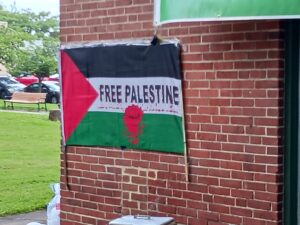 “One particular part of this long, rich history of revolution that stands out to me, is something that I want to speak about briefly. Over 200 years ago, there was a group of Afrikan peoples who were stolen from their homelands and forced into slavery on a small Caribbean island ruled by French colonialism. These people overthrew their masters and the entire system, liberating themselves and their newly-found state and shocking and sending fear into the most powerful global [regime] of the time, in what we now call the Haitian Revolution.
“One particular part of this long, rich history of revolution that stands out to me, is something that I want to speak about briefly. Over 200 years ago, there was a group of Afrikan peoples who were stolen from their homelands and forced into slavery on a small Caribbean island ruled by French colonialism. These people overthrew their masters and the entire system, liberating themselves and their newly-found state and shocking and sending fear into the most powerful global [regime] of the time, in what we now call the Haitian Revolution.
“I tell you this because it sticks out to me. And it sticks out to me because it shows the possibility of revolution and liberation under the most brutal and seemingly insurmountable odds against seemingly invincible world powers. It serves as inspiration for other peoples and their liberation movements. And most of all, it reminds me of the resistance and steadfastness of the Palestinian people, most recently on October 7. October 7 was a day when Palestinians … despite living under 17 years of a brutal siege at the hands of the Zionist entity of Israel, with the full backing of the US and other Western powers, were able to liberate themselves [from their open-air prison in Gaza] and shock the entire global imperialist order.
“Yet on this African Liberation Day, we also take time and recognize that true freedom is still yet to be achieved, and to use this day to serve as a reminder that our primary goal still remains total liberation. For although Afrikan peoples in Haiti freed themselves over 200 years ago, they continue to this day to be punished for daring to revolt against their oppressors. Western imperialists continue to [impose] an armed intervention and another illegitimate government on the Haitian people. Since October 7, the Zionists have [pursued a policy of genocide against the Palestinian people] with the full support of the US, murdering over 40,000 Palestinians… . Even here in Baltimore, nearly 10 years after the uprisings following the murder of Freddie Gray, we still see collaboration between Zionists and anti-Black forces. We see cops of Cop City [training with] the Israeli police, we see the police force of Johns Hopkins University, a university that invests materially in the Israeli genocide, we even see collaboration between local Zionist institutions and the Black Misleadership Class. …
“I say all this to you not to [bring] gloom and doom, but to say we must take note of this. Not just because they are major threats to our collective liberation, but because they [present] lessons of how our enemies are operating, and consequently how we must operate. Our enemies are organized and united. Not just locally here in Baltimore, but internationally. With military alliances like NATO [North Atlantic Treaty Organization], AFRICOM [Africa Command], RIMPAC [Rim of the Pacific, US Pacific Fleet], and economic alliances like NAFTA [North American Free Trade Alliance] and AIPAC [America-Israel Public Affairs Council]. And that … is why it’s more important than ever to get our people organized and united. I urge you, every single one of you here, if you have not already found an organization here, find one, and see how you can join and get involved with some work. Make a lifelong commitment to organized struggle in some sort of liberation movement. It is how we will achieve that total liberation I spoke about earlier. And you may feel overwhelmed, and disheartened at times by the task ahead. Even I sometimes feel like that. But when I do, I need only look back at history, because history has shown us, whether we’re talking the Haitian Revolution, or October 7, or beyond that, that when we organize and unite, not only is liberation possible but it is inevitable.”
Comrade Nnamdi Lumumba, Ujima Peoples Progress Party (UPP), which is building a Black worker-led political party in Maryland and stands in solidarity with the Palestinian people, echoed and reinforced the words of Bro. Sami and Baba Paup Pumphrey. “I want to greet you all with a Swahili word, Uhuru Sasa, Freedom Now. Something that we say should be on the minds of oppressed and colonized people all the time.
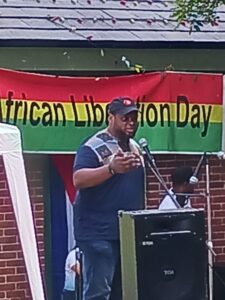 “I want to talk to you a little bit today about the world that we’re living in. As we sit here in Baltimore City, state of Maryland, the capital of imperialism here in the United States, there is genocide being carried out in [occupied] Palestine. There is mass murder and genocide being committed in the Congo as Comrade Paul mentioned. There are resources all over South America, Afrika, and hell, right here in Baltimore that are being extracted, so that the richest class of people ever known, the richest nation ever known, can have not just trillions of dollars, but more money than they could ever imagine. We raise that because it’s important to not just associate the liberation of Afrika separate from the real world, that we exist in the real world to defeat imperialism, to defeat White Supremacy, to defeat colonialism. That we exist in a world where we have a role, with other struggles, to liberate the world. We obviously have to liberate ourselves, but the fact is, if you liberate Afrika, you start to choke out imperialism. You steal back all the wealth that Europe has used to build itself. What is France without Afrika? What is England, who had an empire upon which the sun never set, without Afrika and the oppression of the Indigenous peoples in the Americas? If we take back the resources, we begin to choke out Western imperialism and any of their lackeys who we call neocolonialists, Black faces, Brown faces, serving the interests of White power.
“I want to talk to you a little bit today about the world that we’re living in. As we sit here in Baltimore City, state of Maryland, the capital of imperialism here in the United States, there is genocide being carried out in [occupied] Palestine. There is mass murder and genocide being committed in the Congo as Comrade Paul mentioned. There are resources all over South America, Afrika, and hell, right here in Baltimore that are being extracted, so that the richest class of people ever known, the richest nation ever known, can have not just trillions of dollars, but more money than they could ever imagine. We raise that because it’s important to not just associate the liberation of Afrika separate from the real world, that we exist in the real world to defeat imperialism, to defeat White Supremacy, to defeat colonialism. That we exist in a world where we have a role, with other struggles, to liberate the world. We obviously have to liberate ourselves, but the fact is, if you liberate Afrika, you start to choke out imperialism. You steal back all the wealth that Europe has used to build itself. What is France without Afrika? What is England, who had an empire upon which the sun never set, without Afrika and the oppression of the Indigenous peoples in the Americas? If we take back the resources, we begin to choke out Western imperialism and any of their lackeys who we call neocolonialists, Black faces, Brown faces, serving the interests of White power.
“Afrikan people can live without imperialism. Afrikan people can live without capitalism. We can live without White Supremacy. That is the only solution that makes sense.”
— Comrade Nnamdi Lumumba
“We have this upcoming election cycle that many of you are either impressed by or don’t give a damn about. The truth is, you should care, not whether you vote, but you should care. Because right now, millions of people in this country are being told that they have a choice between Genocide Joe Biden from the Democratic Party or Fascist Donald Trump, and then you have to decide, when you vote, which one you can live with. The truth is, Afrikan people, you can live without White power. You can live without imperialism. You can live without capitalism. Do not pick representatives that will impoverish your people. Do not pick representatives that will impoverish the world. I don’t know how you feel about that. But Genocide Joe just sent 43 billion dollars to be used to make weapons pf destruction to destroy babies, and innocent men and women, and to keep colonialism in the hands of the Zionist state. People tell you to be afraid of Hamas. Don’t be afraid of Hamas. If you are afraid of Hamas, you’re afraid of Nat Turner. Because they told Nat Turner, the only way to get free is to negotiate with your oppressor. How the hell is Hamas supposed to negotiate with its oppressor? If you really want to understand Pan Afrikanism, then you have to understand who is the oppressed and who is the oppressor. That’s what you have to understand. You don’t have to make a compromise choice. Afrikan people can live without imperialism. Afrikan people can live without capitalism. We can live without White Supremacy. That is the only solution that makes sense. Not the lesser of two evils. Not choosing between one bad guy and another bad guy. The truth is that we have to build our own organization. We have to have our own clarity about what the world looks like. We have to be able to develop the future, not just for ourselves and our children but for our whole planet. We have an imperialist monster that is literally making it impossible to breathe. Making it literally impossible to have fresh water. Changing the environment. You can’t wait for a good White man to get elected next time. You have to build institutions. You have to build liberation structures. You have to develop cadre for the next phase of the struggle. That is what we’re talking about on African Liberation Day.”
The Prophet of Poetry shared his poem “Mama Prays”.
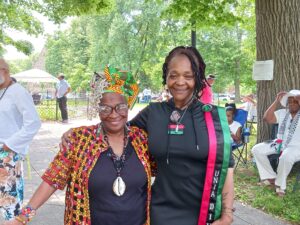
Grandmother Edna and Mama Earth (UNIA-ACL Baltimore).
Mama Earth, Lady President of UNIA-ACL Baltimore Division 106 Barca-Clarke, performed a musical number after greeting the amassed crowd. “Peace and love, everybody. I greet you all in love. … I’m gonna do this, and I hope that I do it in a way that I’m paying respect to our Ancestors who paved the way for us.”
She introduced Bro. Everett Winchester, President of the UNIA-ACL Baltimore Division 106 Barca-Clarke, and then she did a rendition of The Star Spangled Banner that many will find unfamiliar but perhaps more accurate on this African Liberation Day (“Oh say, can you see, by the blood in the street … This is not the land of the free, but the home of the slave”).
Proverbs Reggae Band took the stage and performed for about an hour, entertaining the crowd with several reggae and protest songs.
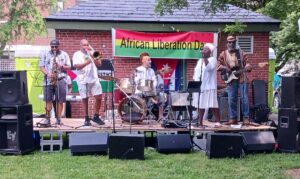
Proverbs Reggae Band performs.
Bro. Andre Powell of the Baltimore Peoples Power Assembly spoke about the campaign to force the Baltimore City Council “to pass a resolution to call for a cease fire and to divert from financial dealings with Israel, especially the cooperation between the Baltimore City Police and the Israeli Defense Forces,” in the spirit of the 1970s student protests against the Vietnam War and the 1980s effort to force the Baltimore City Council to divest from the South African apartheid government. He noted that US imperialism has been targeting Afrikan nations as well, “with security forces in cooperation with repressive regimes through AFRICOM” in a continuing effort to exploit Afrika’s natural resources. He contrasted this with the more cooperative arrangements that have been reached between countries like Zimbabwe and China, which has resulted in US trade embargos and sanctions.
Sis. Sheena, NAACP, spoke about the grassroots effort to support Marilyn Mosby, who was targeted by the system after her efforts to bring the officers under whose custody Freddie Gray died in 2015, and similar activism against corrupt police officers and on behalf of wrongly incarcerated citizens despite budget cuts from Annapolis and threats from then President Donald Trump. www.justiceformarilynmosby.com was established to share information and amass popular support. She credited grassroots activist Bill Goodin, local radio host Tyrone Bost and others for their steadfast support of Ms. Mosby.
Bro. Jackie, saxophonist, wrote a piece for Freddie Gray’s mother, which he performed on the stage. First, he had this to say: “It’s good to see people come together for Marilyn Mosby [who prosecuted the police and paid for it], but we have to stick together between these crises. How many of us are exchanging phone numbers? How many of us are gathering together [to] consolidate our various talents?” He spoke briefly about the history of Lafayette Square Park as the location of a civil war-era Union garrison (1861-1865) located inside Maryland, which was a Confederate state. He quoted legendary local civil rights activist Rev. Vernon Dobson, who had stated 25-30 years ago that “we live in a state of cultural apartheid but we don’t really know it.”
Minister Abdur Raheem Shakur from the Lost Found Nation Of Islam and Afro Descendant Nation stated that under the Honorable Silas Muhammad, our political identity according to the UN became known in many circles as the Afro Descendant Nation as a result of outreach from the Lost Found Nation Of Islam. He noted the UN’s definition of Afro Descendants as “people who were forcibly dispossessed of their homeland Afrika, were transported to the Americas for the purpose of enslavement, were subjected to slavery, were subjected to forced mixed breeding, have experienced the loss of mother tongue, culture and religion, and have experienced racial discrimination due to lost ties and partially lost ties from our original identity.” He called for “land that we can call our own” and “separation from the Whites”, and used the UN’s recognition of the Vatican with “800 people” as a separate nation as justification based on the UN’s recognition of the Afro Descendant Nation, and voiced the need for Afrikans to be free from both the Democratic and Republican parties, noting Biden as “the lesser of two evils” even as he pointed out that Trump’s aim to “make America great again” is designed to come at our expense.
Bro. Cliff, Maryland Facilitator of the Sixth Region Diaspora Caucus (SRDC), Deputy Coordinator for North America of the Pan African Federalist Movement (PAFM), mentioned his favorite statement from The Honorable Marcus Mosiah Garvey:
“The thing to do is to get organized. Stay separated and you will be exploited, you will be robbed, you will be killed. Get organized and you compel the world to respect you.”
“That was an instruction, and it is an instruction that many of us are trying to follow but not enough of us are trying to follow it.
“The Sixth Region Diaspora Caucus was founded in 2006, and its primary mission is the organization of the voice of the grassroots Pan Afrikan Diaspora, so that it can be expressed on the world stage. We do it through Pan Afrikan Town Halls that we invite the grassroots community to come out to, so that the community can itself determine not only what its key issues or Pan Afrikan Agenda are, but also so the community can decide who speaks for us on the national and international stage, in other words, not appointing someone, not anointing ourselves, but asking the community, Who do you want to speak for you, and what do you want them to say? And that is what SRDC has been pushing for since 2007, 2006. Off and on, we’ve had success or not success. But that’s one of the hats I wear.
“The other hat I wear is [the Pan African Federalist Movement]. PAFM’s purpose is to unify the 55 Afrikan countries, the 15 or so Afrikan-ruled nations in the Caribbean and Black populations in countries around the Diaspora in a political organization known as the United African States. Instead of just the African Union with 55 Afrikan countries, the idea is to create a continental entity that includes all of us. Diaspora and everyone else. It’s a political orientation as far as organizing our people.
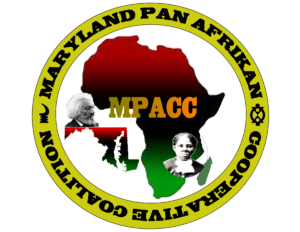 “So, SRDC is involved in raising the voice of the grassroots. PAFM is involved in political unification. They’re different missions, but they actually work together. And the point is, neither of those organizations can actually accomplish its own mission all by itself. As a result, the main thing that I’ve been involved with over the last several years is [what we call] the Maryland Pan Afrikan Cooperative Coalition. I have seen at conference after conference, convention after convention, event after event, organizers take the stage and say, ‘We must come together; Afrika must unite’, and yet somehow or another we seem to be in the same position year after year after year. A lot of it is because of the failure of many of our organizations to actually come together in these coalitions to unify our people like we say must be done.
“So, SRDC is involved in raising the voice of the grassroots. PAFM is involved in political unification. They’re different missions, but they actually work together. And the point is, neither of those organizations can actually accomplish its own mission all by itself. As a result, the main thing that I’ve been involved with over the last several years is [what we call] the Maryland Pan Afrikan Cooperative Coalition. I have seen at conference after conference, convention after convention, event after event, organizers take the stage and say, ‘We must come together; Afrika must unite’, and yet somehow or another we seem to be in the same position year after year after year. A lot of it is because of the failure of many of our organizations to actually come together in these coalitions to unify our people like we say must be done.
“We should have learned the lessons of history. We should have learned what happened to the Black Panther Party when they were subjected to a campaign of media demonization, infiltration by agents provocateur and simultaneous prosecution of Panther leadership from coast to coast. Because the Panthers didn’t have enough friendly organizations standing beside them, ready to defend them in court, ready to deal with the media demonization and ready to help them root out [infiltrators], the Panthers were ultimately brought down by the forces of this country. We should have learned from Black Wall Street, a great economic achievement, but it couldn’t sustain itself. Why? Because it was destroyed by a military style attack. The point is, our organizations all have part of the answer. They don’t have all of the answer. Too many of us think that we can handle the problems of our people all by ourselves. And the fact of the matter is, we can’t do it. We’re all here together at African Liberation Day, gathering together, talking about organizing, because we all at some point realize that we, as organizers, can’t solve the problems of Afrikan people without each other. It’s not just ‘I Have The Answer’. It’s not just ‘Under My Leadership’. It’s about all of us together, building something cooperatively.
“So, toward that end, we’ve been meeting as a Maryland Pan Afrikan Cooperative Coalition over Zoom for the last two years. We’re going to start holding public meetings. We’re going to have a public Town Hall Meeting on July 13 at the Temple of New Afrikan Thought. The idea will be to once again start organizing our community on the grassroots level, but also to bring in as many different Pan Afrikan organizations as we can. Again, The Honorable Marcus Mosiah Garvey said we have to organize. We also have the words of [Black Panther Party] Field Marshal George Jackson. He said ‘Settle your quarrels. Come together. Understand the reality of our situation. Understand that fascism is already here. That people are dying who could be saved. That generations more will live poor, butchered half-lives of you fail to act. Do what must be done, discover your humanity and your love of revolution.’
“We can come together [for] African Liberation Day and we can take the stand and we can talk about how Black people must come together, but at some point or another we have to actually get down and do it. We have to actually get down and do it. And what we’re trying to do with the Maryland Pan Afrikan Cooperative Coalition, which, if things go the way we hope they will go, will become a general Pan Afrikan Cooperative Coalition which will pull our people in from across the country and around the Diaspora, is to create a vehicle by which that can actually happen.
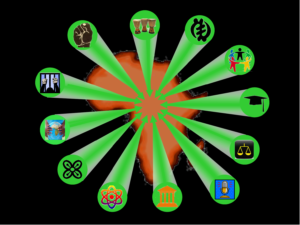 “The structure that we propose is this: I call it ‘Spokes of the Wheel’. It’s not my idea. Mary McLeod Bethune came up with an idea just like this [with the National Council of Negro Women] in 1935. Mary McLeod Bethune saw in 1935, and we should know already by now, that none of us can accomplish our own mission by ourselves. The idea of a Cooperative Coalition is to bring together different types of Pan Afrikan organizations, bring revolutionary Pan Afrikanists together with the economic builders, together with the media, together with the lawyers, together with the educators, together with the cultural activists, together with the international activists, the scientists and the health professionals, the prison activists, and on and on and on, bring all of our different organizations and activists together, and get away from this ‘I Have The Answer’ mentality that prevents so many of us from actually unifying and coming together. … What we want to do is bring all of our different Pan Afrikan organizations together, not under one person, but as a Cooperative Coalition working together as equals. This is not a hierarchical chart. This chart depicts different types of organizations gathered around a central goal in a circle. And their missions to achieve that goal, a free, united, prosperous Afrika at peace with itself and its people, are represented as spokes.”
“The structure that we propose is this: I call it ‘Spokes of the Wheel’. It’s not my idea. Mary McLeod Bethune came up with an idea just like this [with the National Council of Negro Women] in 1935. Mary McLeod Bethune saw in 1935, and we should know already by now, that none of us can accomplish our own mission by ourselves. The idea of a Cooperative Coalition is to bring together different types of Pan Afrikan organizations, bring revolutionary Pan Afrikanists together with the economic builders, together with the media, together with the lawyers, together with the educators, together with the cultural activists, together with the international activists, the scientists and the health professionals, the prison activists, and on and on and on, bring all of our different organizations and activists together, and get away from this ‘I Have The Answer’ mentality that prevents so many of us from actually unifying and coming together. … What we want to do is bring all of our different Pan Afrikan organizations together, not under one person, but as a Cooperative Coalition working together as equals. This is not a hierarchical chart. This chart depicts different types of organizations gathered around a central goal in a circle. And their missions to achieve that goal, a free, united, prosperous Afrika at peace with itself and its people, are represented as spokes.”
Baba Rafiki Morris, of the Maryland Council of Elders (MCOE), A-APRP, Black Alliance for Pece (BAP) Coordinating Committee, member of the African Party for the Independence of Guinea-Bissau/Cape Verde (the party of Revolutionary Ancestor Amilcar Cabral), gave what amounted to a keynote address.
“African Liberation Day is one of the few chances we get to look back on the year that we have lived, and to record and to take note of the victories and defeats that we have suffered over that year. And this year has been a historic year. Since we were here last, three states in West Africa have come together to form the Alliance of Sahel States. Since we were here last, the US is being thoroughly trounced in Ukraine. Since we were here last, they had a meeting of Uncle Toms in Afrika with Uncle Sam to discuss how they’re going to divide up Afrika’s resources and give more to the US. Since we were here last, these Zionist pigs have killed over 35,000 men, women and children. Since we were here last, imperialism is being pressed to the wall. I said, imperialism is being pressed to the wall. I said the enemy is being pressed to the wall! And we intend to keep the pressure on them.
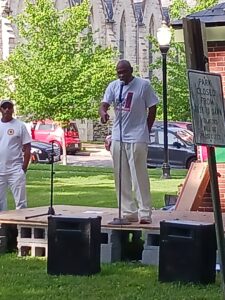 “I told you before, before you leave here you would understand the relationship between the struggle that is going on in Palestine right now and the struggle pf Afrikan people around the world. And that relationship is this: Israel is the US sounding board, the US post, in the Middle East. It’s the gateway to Asia, it’s the gateway to Russia, it’s the gateway to Europe and it’s the gateway to Afrika. And as someone said earlier, all Israel does is disrupt the lives of all the countries around it. And they do that to implement the US’s agenda. To implement the US’s plan to steal the resources of the people of the world and bring them to the US so that they can make money. When the Palestinians rise up and take Palestine back from the Zionists, the US has got a problem, y’all. And that problem benefits us. The US is weaker without Israel. The US doesn’t have the control that it has over the Middle East without Israel. The US can’t continue to do what it’s doing in Afrika. You know Israel is the world’s number one processor of diamonds, and ain’t no diamonds in Israel. The diamonds come from the Congo. The diamonds come from South Africa. The diamonds come from Rwanda. The diamonds even come from Haiti. So, bringing down the illegal, racist, settler-colonial state of Israel is part and parcel of the struggle to liberate Afrika. Now, I want to make sure you understand what I’m saying — Israel is a settler colony, right? Y’all sound like you ain’t sure. Israel is a settler colony. Y’all know another settler colony? The one you’re sitting in! That’s a settler colony. This is occupied territory. You don’t see native American people around here. Why? Because they committed genocide against them people. Where do you think the Israelis learned how to commit genocide? They learned it from the people that committed genocide right here and stole you from Afrika and brought you here. That’s where they learned how to commit genocide. They learned to commit genocide watching the Australians, the British prisoners that they shipped to Australia, who massacred the Australian Aboriginal people with smallpox, killed 97% of their population, to take Australia. That’s where they learned how to commit genocide. So if you’re against settler-colonialism in Palestine, you must be against settler-colonialism right here in America where you live, where you grow, where they miseducate your children, where they send your children off to wars to die for American imperialism. If you are against settler-colonialism anywhere, you must be against settler-colonialism everywhere.
“I told you before, before you leave here you would understand the relationship between the struggle that is going on in Palestine right now and the struggle pf Afrikan people around the world. And that relationship is this: Israel is the US sounding board, the US post, in the Middle East. It’s the gateway to Asia, it’s the gateway to Russia, it’s the gateway to Europe and it’s the gateway to Afrika. And as someone said earlier, all Israel does is disrupt the lives of all the countries around it. And they do that to implement the US’s agenda. To implement the US’s plan to steal the resources of the people of the world and bring them to the US so that they can make money. When the Palestinians rise up and take Palestine back from the Zionists, the US has got a problem, y’all. And that problem benefits us. The US is weaker without Israel. The US doesn’t have the control that it has over the Middle East without Israel. The US can’t continue to do what it’s doing in Afrika. You know Israel is the world’s number one processor of diamonds, and ain’t no diamonds in Israel. The diamonds come from the Congo. The diamonds come from South Africa. The diamonds come from Rwanda. The diamonds even come from Haiti. So, bringing down the illegal, racist, settler-colonial state of Israel is part and parcel of the struggle to liberate Afrika. Now, I want to make sure you understand what I’m saying — Israel is a settler colony, right? Y’all sound like you ain’t sure. Israel is a settler colony. Y’all know another settler colony? The one you’re sitting in! That’s a settler colony. This is occupied territory. You don’t see native American people around here. Why? Because they committed genocide against them people. Where do you think the Israelis learned how to commit genocide? They learned it from the people that committed genocide right here and stole you from Afrika and brought you here. That’s where they learned how to commit genocide. They learned to commit genocide watching the Australians, the British prisoners that they shipped to Australia, who massacred the Australian Aboriginal people with smallpox, killed 97% of their population, to take Australia. That’s where they learned how to commit genocide. So if you’re against settler-colonialism in Palestine, you must be against settler-colonialism right here in America where you live, where you grow, where they miseducate your children, where they send your children off to wars to die for American imperialism. If you are against settler-colonialism anywhere, you must be against settler-colonialism everywhere.
“… imperialism is being pressed to the wall.”
— Baba Rafiki Morris
“We’ve had a very interesting year. The [pro-Palestinian protesters] started in the streets, and they left the streets and they moved to the college campus. And they set up encampments on the college campus. And they said they were going to stay there until all the money that these colleges invest in Israel is divested. But they didn’t know that the university professors are all Zionists, and them Zionist administrators at these universities sic’d the police on these kids for sitting down and asking for justice. Over 3,000 of them got locked up for justice. Locked up for fighting against imperialism. Locked up for fighting for your liberation. You hear what I said? Fighting for your liberation! Well, why are they fighting for your liberation? Because they’re fighting imperialism, that’s how. They’re fighting your enemy. And you ain’t always out there with them. And I’m gonna tell you the truth. I don’t understand that.
“I’ve been having conversations with people that come up to me and ask me, ‘Well Rafiki, why y’all don’t talk about the Congo?’ And I asked [them], ‘What are you doing for the Congo?’ Because I talk about the Congo all the time. I talk about Afrika, all of it. Every country in Afrika. We want to free the whole of Afrika. But these people are running around here talking about ‘Why you ain’t talking about the Congo’ are trying to justify why they ain’t talking about Palestine. And not talking about the Congo is not a justification for not talking about Palestine. If you’ve got a heart in your chest, if you’ve got morals and a conscience in your mind, if you have human compassion and you look at that TV, and see what the Israeli Zionist pigs are doing to the Palestinian people, it is your duty to support those people! It is your duty to stand up! You don’t have to know nothing about Palestine. All you gotta know is right or wrong, and I know your Mama taught all of y’all right and wrong. So if you know right from wrong, you know Uncle Sam is wrong, and the Palestinians [are] right.
“We have had a very interesting year. And I’ve heard the talk that we’ve had today about unity. But I’ve got in a position, unplanned, where I could look at the national activity of a number of organizations, and become intimately connected with their inner workings, and seeing how they interact with each other. And in the process — I wasn’t expecting this, but this is what happened — I got to see how the enemy divides us. Because I saw the same thing happening over here that was happening over there. Same thing happening in Tennessee that’s happening in California. Same thing happening in Baltimore that’s happening in Philadelphia and Boston and Raleigh, North Carolina. The same thing that’s happening to our people all over the United States is the same thing that’s happening to our people in Afrika. What is this thing? It ain’t infiltrators. It ain’t agent provocateurs. It’s our own pettiness. Our own individualism. Our own ambitions. Our own unwillingness to submit ourselves to organizational discipline so that we can carry out the objectives that we collectively have defined and decided, that is what we want to do. We are our own worst enemy in this state. The enemy doesn’t have to come in us and among us to divide us, because he put his ideas in our heads. He put his way of thinking in our minds. He has made us think that their culture is our culture. That what they should do is what we should do. That our way to get what we need is the same thing to do how he got what he wanted. And it ain’t true. ‘Cause this pop culture, that ain’t our culture. That’s the enemy’s culture. Our culture is resistance. How do you think we survived 500 years of this stuff? Resistance. How do you think we overcame slavery? Resistance. How do you think we crushed Jim Crow? Resistance. How do you think we’re gonna defeat capitalism and imperialism? Resistance! Resistance is what we need. And the reason we need to unify is so that we can resist better. We don’t need to unify so that we can hold hands and walk down the streets skipping, singing “We Shall Overcome”, no. We need to unite so we can fight our enemy. We need to unite so we can defeat our enemy. We need to unite so we can let the masses of the people of the world know, that we are in this fight with you until the very end. You’re in the belly of the beast, y’all. And your job is not just to survive this place. Any old thing can survive. A cat, a rat and a dog, they can survive. And they can be complete and totally developed rats, cats and dogs, and don’t do nothin’ but survive. But we are human beings. We have to do more than survive. We have to grow. We have to develop. We have to build. We have to raise civilizations from the ground, and bequeath what we produce to our children. We have to give more to this world than we take from it. This is our task. It’s not just to survive America. It’s not just to make noise to America. It’s not just to speak truth to power. No. Our job — and we’re the only ones who can really do this, you know — our job is to bring this system down! Our job is to destroy capitalism. Ain’t nobody else in America ever burn 65 cities. That’s what we did. We know how to do this thing. And the reason we ain’t doing it now is because we just ain’t organized.
“And this brings me to my conclusion. Afrikans, you gotta get organized. You gotta join something. You gotta join somebody. The most simple task you have is to educate yourself. To free your mind of the backward ideas that you have. But I’m gonna tell you something. You can’t do that alone. You have to do that with other people. Y’all need to share ideas. Y’all need to come up with a collective understanding. Y’all need to develop a strategy to go forward together. So if you really, really want to free your mind, you need to join an organization that’s fighting for the masses of the people.
“I never — and they’ll tell you — I never ask anybody to join the A-APRP. I’ve been a member of the All African People’s Revolutionary Party for 50 years. And I never ask anybody to join our party. And the reason I don’t ask them is because [Baba Yahya] will ask them, but the other reason I don’t ask people to join the party is because this is some serious stuff we’re into. And if you join it because I asked you, you probably ain’t going to stick around long enough to do what we’ve got to do. So I need you to be thinking, and make up your own mind, to check out all of the organizations around you, and figure out which one best suits your understanding of what needs to be done. Join that organization. If it’s the A-APRP, the All African People’s Revolutionary Party, that’s fine. If it’s another organization, that’s fine. But if it’s no organization, that’s not fine. My Brother, Kwame Ture, said ‘If you are a member of an oppressed people in need of organization, and you refuse to join an organization, by the very act of your inactivity, you’re against your people.’ So if your people need you to do something, and you do nothing, then you’re against your people. How many of y’all are against your people? How many of y’all ain’t doing nothing? Raise your hand. There, we’ve got one honest person. The rest of y’all ain’t talking. But that’s all right.
“So, I’ve taken a little extra time today, because this is a historic moment, a historic moment, where one of the most important aspects of the capitalist imperialist enterprise is about to fall. Everything is going to change when Zionism is destroyed. Everything is going to change when Israel falls. And I hope, against hope, that we are organized and ready to make that change.
“I want to announce that on the 15th of June, at Douglass Memorial Church on 1375 Madison Avenue … from 12:00, we’re having a Town Hall. This Town Hall is called ‘Students In Resistance’. It’s about the youth and the students coming together and figuring out what you’re going to do. We’re not coming there to tell you what to do. We want you to come in there, and fight with each other, and figure out what you’re going to do, and then tell us what you want us to do. We think the youth have to be at this stage. We think the youth have to be the tip of the spear. And in order to be that tip, you have to also be organized. So we want you to all come out to the Town Hall. You will find flyers on the table over on this side. That’s the A-APRP table, and you will also find flyers at the Black Alliance for Peace table. Please come out, please join us in these Town Halls. They are very important. … Once again, we want to thank you all for coming. We want to say to you as we say every time we come in front of you, as always, we stand ready for the revolution. Thank you very much.”
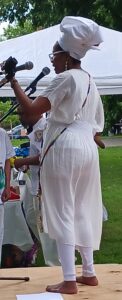 Mama Abena Disroe Morris, co-chair of MCOE, usually performs a spoken word piece as the “High Priestess of Poetry”, and she did so at this African Liberation Day. But she also had advice for the gathered people. “If you belong to an organization for the liberation of our people, us, raise your hand. … Now, those people who did not raise your hands, there’s a lot of organizations present today, A-APRP, A-AWRU, BAP, Ujima, there’s a lot of organizations here, if you’ve been paying attention and listening to the organization that they’re speaking on behalf of. … Every Afrikan should belong to an organization fighting for the liberation of our people. … If you do not belong to one, you need to join an organization next week. If you don’t know what organization to join, start studying … but you need to join an organization.”
Mama Abena Disroe Morris, co-chair of MCOE, usually performs a spoken word piece as the “High Priestess of Poetry”, and she did so at this African Liberation Day. But she also had advice for the gathered people. “If you belong to an organization for the liberation of our people, us, raise your hand. … Now, those people who did not raise your hands, there’s a lot of organizations present today, A-APRP, A-AWRU, BAP, Ujima, there’s a lot of organizations here, if you’ve been paying attention and listening to the organization that they’re speaking on behalf of. … Every Afrikan should belong to an organization fighting for the liberation of our people. … If you do not belong to one, you need to join an organization next week. If you don’t know what organization to join, start studying … but you need to join an organization.”
Rev. Kobi Little, president of the Baltimore chapter of the National Association for the Advancement of Colored People (NAACP), has helped to raise the profile of that venerable civil rights organization since becoming the president of its Baltimore chapter. He offered the following words to the audience: “Whether we believe we are Afrikan people or not, we are. The front line for Afrikan liberation in Baltimore is in all the legislative bodies, all the commissions and committees. Those are the places where they make the policies that oppress us as Afrikan people. And so, we need our Sisters and Brothers who believe in resistance, we need our Sisters and Brothers who believe in Afrikan liberation, we need our Sisters and Brothers who want to be on the front lines of the fight for freedom and justice and equity, we need you to be showing up and bringing the truth, bringing the Afrikan perspective, to the City Council, to the School Board, to the General Assembly, to the Police Accountability Board, and all of these White Supremacist bodies and these bodies that carry the water for White Supremacy. We need you to show up and influence them when they’re trying to make these oppressive policies, because if you wait until the oppressive policies are made, then we’re playing catch-up. And it’s time for us to be on the offense and not always playing defense. What we saw about Marilyn Mosby was not just about Marilyn Mosby. That was about White Supremacy beating back our quest for justice. And we have to be able to discern and understand when the issue is bigger than a person or a personality. So, I’m grateful to be here on African Liberation Day, to share in solidarity with the Sisters and the Brothers.”
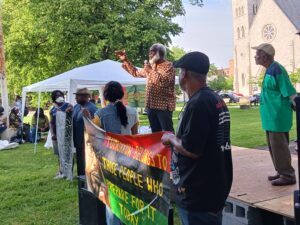
Rev. Kobi Little (on stage) with fellow activists, including Bro. Tyrone Bost (hat, left), Bro, Bill Goodin (hat, right) and Baba Charlie Dugger (also on stage).
Bro. Tyrone Bost, local podcast and radio host, gave credit to several of the activists who worked on behalf of Marilyn Mosby in her federal court case, several of whom joined him on the stage. The previous week, Ms. Mosby was sentenced to one year of home detention followed by two years of probation after having been convicted on charges related to financial fraud that her supporters have insisted were nothing more than a witch hunt for “using her own money” and for relatively minor infractions that have been committed by others in the past but were highlighted in her case mainly because of her prosecution of the Baltimore police officers in whose custody Freddie Gray had died in 2015. “This is bigger than Marilyn Mosby. Marilyn Mosby herself has said that, that this is bigger than her. As I said in court, if the police can go into a neighborhood and break a man’s neck, or commit police murder and crimes in our community, and the prosecutor [can’t] prosecute him without the expectation of being punished, then we live in a de facto police state. How many of you want to live in a police state? Raise your hands. If you don’t want to live in a police state, the next phase for Marilyn Mosby is they’re going to try to take her law license. We need to be at that hearing. … We’ll get that date later and we’ll post it to the Web site. Just recognize, this fight is not over. Home detention is not freedom. It was the best thing we could get. She’s home with her children where she belongs. But she does not deserve any charges. She does not deserve to be a felon for doing her job. Thank you for your time.”
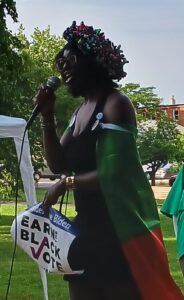 Sis. Sylvie Bello from Washington, DC and originally from Cameroon announced that she was inspired by Harriet Tubman, Frederick Douglass and Baltimore’s own Robert Turner to walk 40 miles from Douglass Maritime Park in the Baltimore Inner Harbor to Washington, DC on the early morning (4:00 AM) of Friday, June 7 to send a message to president Biden that the time has come to put forth an Executive Order in support of HR 40, the Reparations Bill to establish a commission to study reparations that has languished in Congress for decades. She said Biden must do this to “Earn the Black Vote.” She shared a part of a verse from a Cameroonian Makossa song in support of reparations. https://earntheblackvote.net is the Web site, associated with longtime reparations activist Kamm Howard.
Sis. Sylvie Bello from Washington, DC and originally from Cameroon announced that she was inspired by Harriet Tubman, Frederick Douglass and Baltimore’s own Robert Turner to walk 40 miles from Douglass Maritime Park in the Baltimore Inner Harbor to Washington, DC on the early morning (4:00 AM) of Friday, June 7 to send a message to president Biden that the time has come to put forth an Executive Order in support of HR 40, the Reparations Bill to establish a commission to study reparations that has languished in Congress for decades. She said Biden must do this to “Earn the Black Vote.” She shared a part of a verse from a Cameroonian Makossa song in support of reparations. https://earntheblackvote.net is the Web site, associated with longtime reparations activist Kamm Howard.
“[W]hile everybody is running around talking about they’re ready for the revolution, you all had better really get ready because the enemy is getting ready.”
— Mama Saray Vassell
Mama Saray Vassell, who made a major contribution to the event by preparing food that was shared with those in attendance, issued a challenge to all of us who speak of being “ready for the revolution”: “Who has warehouses where food is stored, who has warehouses where the medical supplies are stored, who has warehouses where the weapons are stored? … Everybody thinks that they’re ready for the revolution but I’m telling you, I’ve watched those skinheads … on Instagram, on Facebook, and they are prepared. They are waiting for anything to jump off. They have arsenals, they have food, they have water. If anything happens, we wake up the next day and the water is off, we get up and go to the market and the market is closed. All our enemies have to do is turn the water off, turn the electricity off, and close the supermarkets, and most of us will kill each other for food and water. So, while everybody is running around talking about they’re ready for the revolution, you all had better really get ready because the enemy is getting ready.” Mama Saray’s organization, Prime Time 4 Unity, is a 501(c)3 non-profit organization that is “raising funds to ensure that the people of the community have food on a regular basis” and looks for “opportunities to help by providing people with clothes, shoes, and personal hygiene products for the homeless and less fortunate.” The organization recently began “The We Care Unity Team Food Program” dedicated to feeding our Elders in the community who are shut-ins, with limited mobility and other health issues, delivering home cooked meals. Visit their Web site, https://primetimeforunity.org, for more information and to assist their efforts.
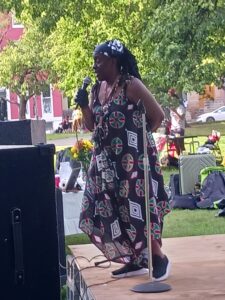 Mama Ujimma Masani, WOMAN (Working, Organizing, Making A Nation), Njia Ya Tayare Martial Arts, Brothers Who Can Cook/Sisters Who Can Burn and The Original Caribbean Sorbet, greeted the attendees and talked about her organization’s participation with local Baltimore schools.
Mama Ujimma Masani, WOMAN (Working, Organizing, Making A Nation), Njia Ya Tayare Martial Arts, Brothers Who Can Cook/Sisters Who Can Burn and The Original Caribbean Sorbet, greeted the attendees and talked about her organization’s participation with local Baltimore schools.
Baba Charlie Dugger, who has been at the forefront of these African Liberation Day events and has been an organizer, supporter and financial sponsor of both African Liberation Day and Garvey Day events for over 50 years, offered some closing remarks. “Malcolm X’s birthday was a week ago, May 19. If he were alive today, he would be 99 years old. … So Malcolm said many things to us as he grew … a man of constant growth. One of the biggest things he said, one of the biggest things we can share on this African Liberation Day, is education. We used to bring Queen Mother Moore here … and Queen Mother Moore would say that Black people are suffering from a constipation of the brain, and we need a brain surgery on our beautiful brain, and the answer to that is education. Then she said the master has mastered the master key, and that instead of him destroying us, we will destroy ourselves. We’ve got to see that, like Brother Rafiki was saying, the saying used to be that we have met the enemy and he is us. And Malcolm X said, the White man has perfected the art of image making to such a degree that he can make the oppressor look like the oppressed and the oppressed look like the oppressor. He can make the criminal look like the victim and the victim look like the criminal. So we’re in a bad way. …
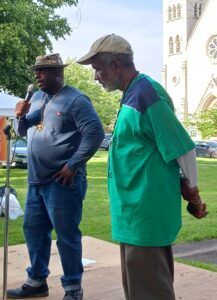
Bro. Tyrone Bost and Baba Charlie Dugger.
“Please, like Brother Rafiki was saying, join an organization. Don’t be a spectator! Life is not a spectator sport. This is really happening. We got a wicked, whiny White man who might become the president again. How can you tell a child it’s not if you win or lose but how you play the game and then you’ve got a sore loser, who’s a convicted rapist and a liar and thief, etc.? But the problem is that we don’t vote. That’s not the only problem but it’s a problem. What’s wrong with us waking up? ‘Well, I’m not gonna vote, I don’t like Biden and I don’t like Trump.’ Well, who do you like? Are you running? I ran for Baltimore Mayor twice. I don’t think I’m all that. I’m a retired teacher, 46 years. But my issues were education, which is still the issue, and the police, which is still the issue. Back in ’87 and back in ’99. We’ve got to develop leadership among our younger people. We gotta do it. Stop standing back. Voting is not the only thing to do. We’re honoring Malcolm. He said ‘By Any Means Necessary’. ‘Education is our passport to the future; tomorrow belongs to those people who prepare for it today’. We talk about Malcolm … he only lived to be 39. Martin only lived to be 39. But they lived filled lives. So we talk about them like they were old men. … We’re stuck in the ghetto of cement. … Gil [Scott-Heron] said ‘No one can do everything but everyone can do something.’ Malcolm said ‘If we don’t think for ourselves, if we don’t see for ourselves, we’re gonna end up hating our friends and loving our enemies.’ …”
Baba Kenyatta Howard performed several songs from Marvin Gaye and Gil Scott-Heron to close out the event on a musical and cultural note. First, he repeated the call for everyone to join an organization “if it’s no more than your block club … There are many community organizations and block clubs looking for young people just like all of you walking around here today. … Your grandmothers and your mothers are looking for your leadership in these community associations. Join an organization. You don’t have to be Einstein. You just have to show up. That’s half the battle in life, is just showing up. Most of us are missing in action while the community is dying. Y’all know these are the end of times. What you waiting for? So I just want to ask you a question. Who really cares to save a world in despair? Who really cares?”
Like this:
Like Loading...
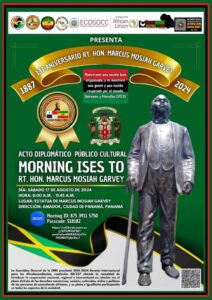
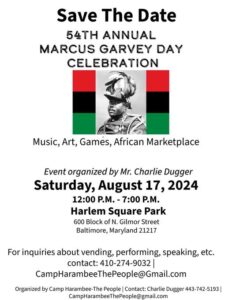
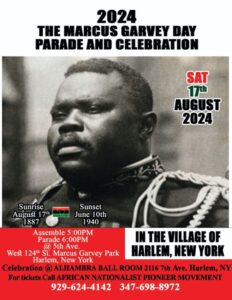

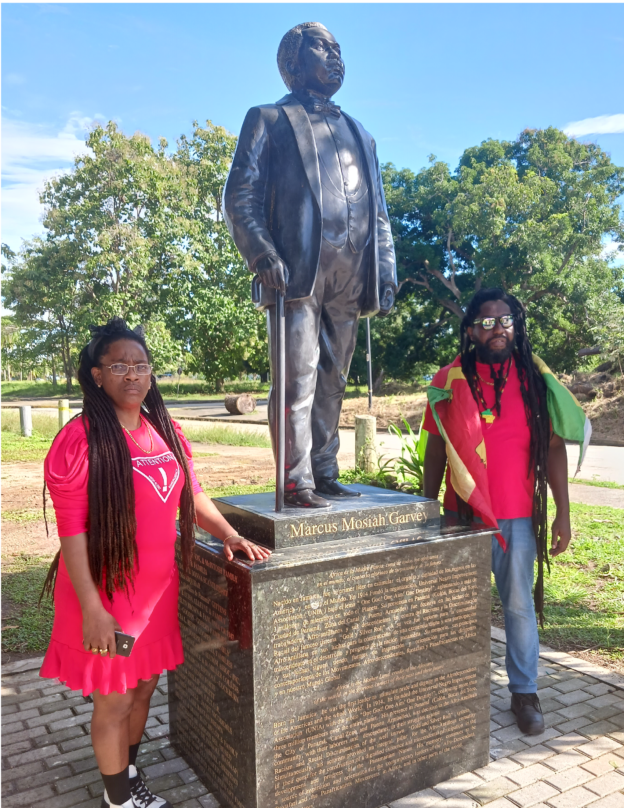
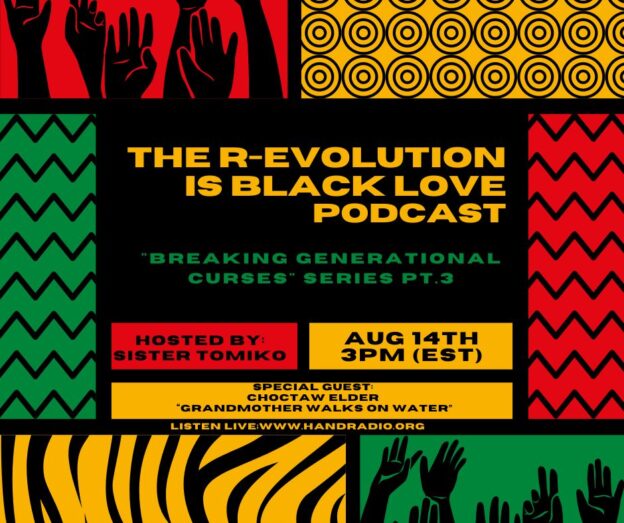
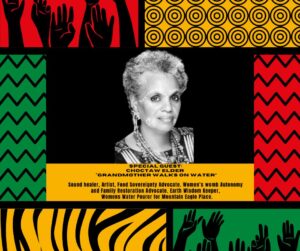
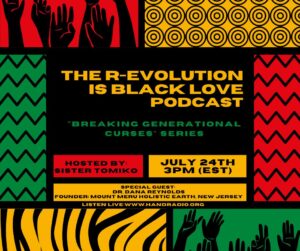
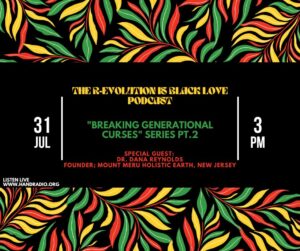
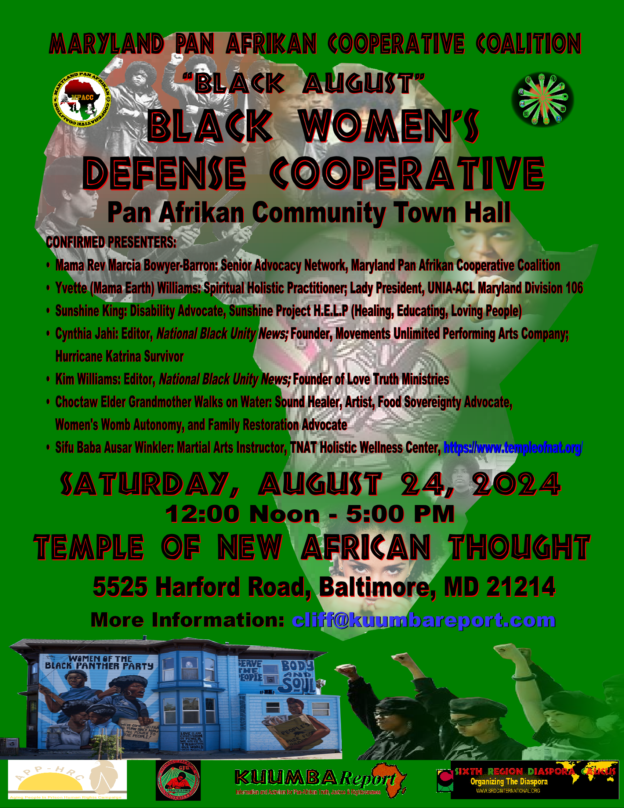
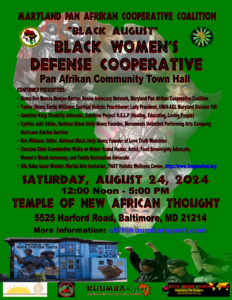
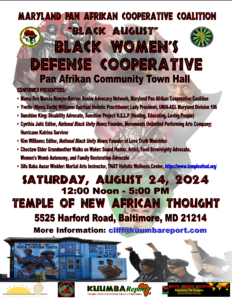
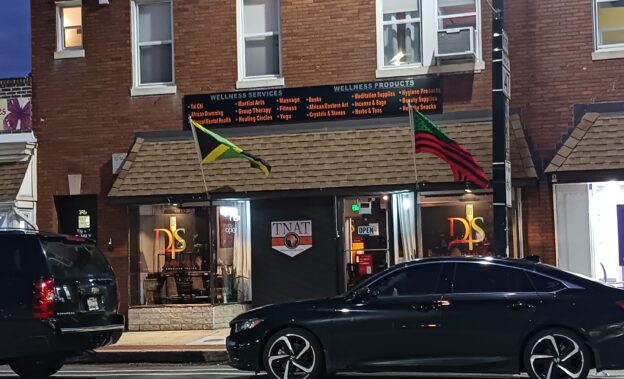
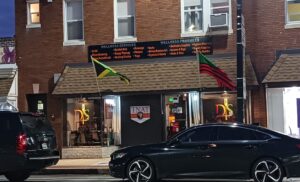 July 13, 2024 saw the “rebirth” of the effort to bring out, organize and harness the voice of the Pan Afrikan grassroots community so that our voice can be included in the larger effort to bring that Pan Afrikan voice to the World Stage. The first Pan Afrikan Community Town Hall Meeting since 2019 (post-COVID) was held at the Temple of New African Thought (TNAT) at 5525 Harford Road in East Baltimore. The meeting was organized by the Maryland Pan Afrikan Cooperative Coalition (MPACC), a broad coalition of Pan Afrikan organizers and activists from the areas of spirituality, culture, economics, education, political organizing, law, prison outreach,
July 13, 2024 saw the “rebirth” of the effort to bring out, organize and harness the voice of the Pan Afrikan grassroots community so that our voice can be included in the larger effort to bring that Pan Afrikan voice to the World Stage. The first Pan Afrikan Community Town Hall Meeting since 2019 (post-COVID) was held at the Temple of New African Thought (TNAT) at 5525 Harford Road in East Baltimore. The meeting was organized by the Maryland Pan Afrikan Cooperative Coalition (MPACC), a broad coalition of Pan Afrikan organizers and activists from the areas of spirituality, culture, economics, education, political organizing, law, prison outreach,  grassroots organizing, revolutionary Pan Afrikanism and more. (More on the Cooperative Coalition can be found on this site under the heading “Spokes of the Wheel”.) These activists hail mainly from Baltimore City, but several are also located in Laurel Maryland, Randallstown Maryland, Washington DC and Virginia, with occasional participants from Philadelphia Pennsylvania, Chicago Illinois, Detroit Michigan, South Carolina, Georgia, Texas and Panama. The Cooperative Coalition hopes to spark similar efforts across the United States and throughout the Diaspora, either as local Cooperative Coalitions that then link together or by expanding directly from Maryland into a national or global Pan Afrikan Cooperative Coalition.
grassroots organizing, revolutionary Pan Afrikanism and more. (More on the Cooperative Coalition can be found on this site under the heading “Spokes of the Wheel”.) These activists hail mainly from Baltimore City, but several are also located in Laurel Maryland, Randallstown Maryland, Washington DC and Virginia, with occasional participants from Philadelphia Pennsylvania, Chicago Illinois, Detroit Michigan, South Carolina, Georgia, Texas and Panama. The Cooperative Coalition hopes to spark similar efforts across the United States and throughout the Diaspora, either as local Cooperative Coalitions that then link together or by expanding directly from Maryland into a national or global Pan Afrikan Cooperative Coalition. The Pan Afrikan Community Town Hall Meetings, originally organized in Baltimore starting in the summer of 2007 by the Maryland Organizing Committee of the Sixth Region Diaspora Caucus (SRDC) under the direction of the SRDC Secretariat, brought together members of the grassroots Pan Afrikan Community to bring out, organize and harness the voice of the community so that we can be included in the larger effort to bring that Grassroots Pan Afrikan voice to the World Stage. SRDC had started holding these Town Hall Meetings in California, New York, Ohio, South Carolina and Washington State in 2006 and early 2007, with other groups doing similar work in Central America and Europe. The overall plan for the Town Hall Meetings was to accomplish the following goals within our local communities:
The Pan Afrikan Community Town Hall Meetings, originally organized in Baltimore starting in the summer of 2007 by the Maryland Organizing Committee of the Sixth Region Diaspora Caucus (SRDC) under the direction of the SRDC Secretariat, brought together members of the grassroots Pan Afrikan Community to bring out, organize and harness the voice of the community so that we can be included in the larger effort to bring that Grassroots Pan Afrikan voice to the World Stage. SRDC had started holding these Town Hall Meetings in California, New York, Ohio, South Carolina and Washington State in 2006 and early 2007, with other groups doing similar work in Central America and Europe. The overall plan for the Town Hall Meetings was to accomplish the following goals within our local communities: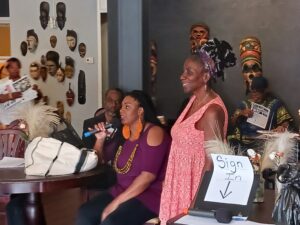
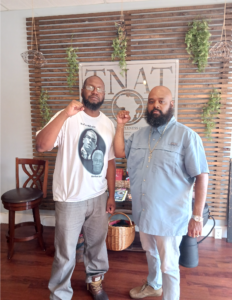
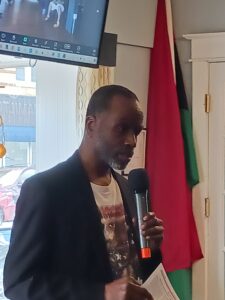
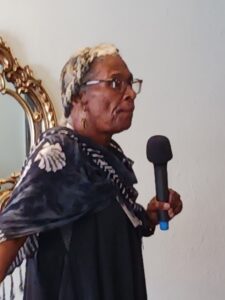

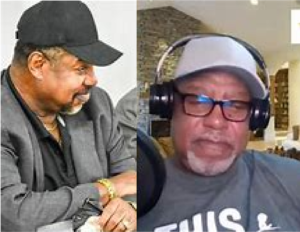
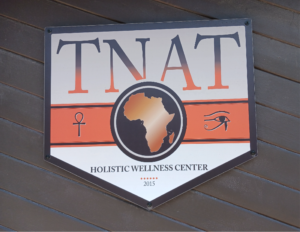
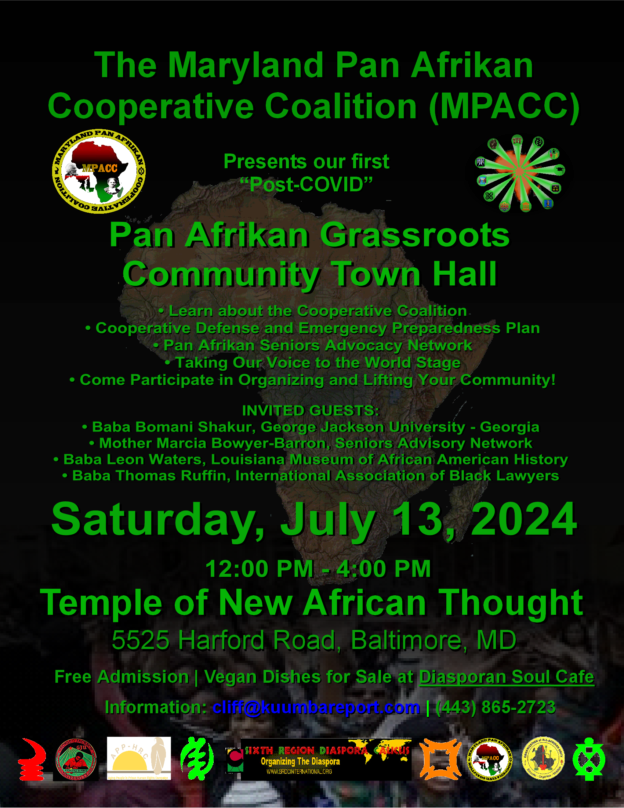
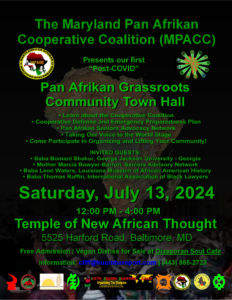 The Maryland Pan Afrikan Cooperative Coalition (MPACC), in cooperation with Aging People in Prison Human Rights Campaign (APP-HRC), the George Jackson University (GJU) and the Sixth Region Diaspora Caucus (SRDC), will hold our first post-COVID Pan Afrikan Community Town Hall Meeting at the Temple of New Afrikan Thought, 5525 Harford Road in Easy Baltimore, on
The Maryland Pan Afrikan Cooperative Coalition (MPACC), in cooperation with Aging People in Prison Human Rights Campaign (APP-HRC), the George Jackson University (GJU) and the Sixth Region Diaspora Caucus (SRDC), will hold our first post-COVID Pan Afrikan Community Town Hall Meeting at the Temple of New Afrikan Thought, 5525 Harford Road in Easy Baltimore, on 
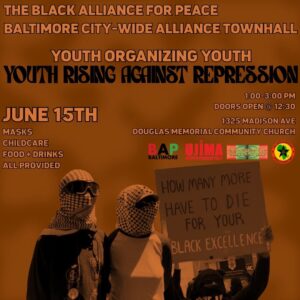
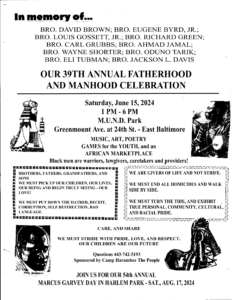
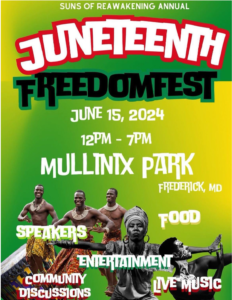
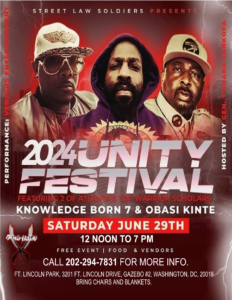
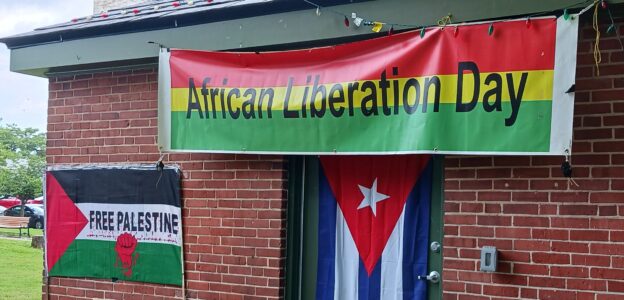
 it continues to impact Afrikan people and People of Afrikan Descent in Afrika and around the world. The Maryland Council of Elders (MCOE), founded in Baltimore in December 2017, in cooperation with veteran community activist Baba Charlie Dugger, has sponsored African Liberation Day observances in Lafayette Square Park since 2019, each time embodying a specific theme to exhort organizers, activists and the general Pan Afrikan community to continue, indeed to intensify, our organizing and resistance activities.
it continues to impact Afrikan people and People of Afrikan Descent in Afrika and around the world. The Maryland Council of Elders (MCOE), founded in Baltimore in December 2017, in cooperation with veteran community activist Baba Charlie Dugger, has sponsored African Liberation Day observances in Lafayette Square Park since 2019, each time embodying a specific theme to exhort organizers, activists and the general Pan Afrikan community to continue, indeed to intensify, our organizing and resistance activities. “Marcus Garvey warned us, Amy Jacques Garvey warned us, Dessalines warned us, our Ancestors are waiting and watching, children are still crying and dying, because we, the people that are still here, are too apathetic to understand the real reason why we were born in the first place. [We think] that you’re born to die. But remember, in the Afrikan tradition, you never die if you are an Afrikan. You move to the next level of life, which is called the Ancestral Realm. And our Ancestors are very much alive. Make no mistake, because you will be punished of you do not find out who you are in the next realm. Now, I’m not here to glorify you with a speech, but I’m here to warn you. The time is now. The majority of youth in the world are on the Afrikan Continent. The next continent is South America. So y’all folks in North America need to get your act together and overstand, Brothers are waiting that speak Portuguese, that speak French, that speak Spanish, that speak all kinds of Afrikan dialects. And believe me, what you see happening in the Sahel (with the recently-established Alliance of Sahel States between Niger, Mali and Burkina Faso — Editor) is the beginning of us coming together.
“Marcus Garvey warned us, Amy Jacques Garvey warned us, Dessalines warned us, our Ancestors are waiting and watching, children are still crying and dying, because we, the people that are still here, are too apathetic to understand the real reason why we were born in the first place. [We think] that you’re born to die. But remember, in the Afrikan tradition, you never die if you are an Afrikan. You move to the next level of life, which is called the Ancestral Realm. And our Ancestors are very much alive. Make no mistake, because you will be punished of you do not find out who you are in the next realm. Now, I’m not here to glorify you with a speech, but I’m here to warn you. The time is now. The majority of youth in the world are on the Afrikan Continent. The next continent is South America. So y’all folks in North America need to get your act together and overstand, Brothers are waiting that speak Portuguese, that speak French, that speak Spanish, that speak all kinds of Afrikan dialects. And believe me, what you see happening in the Sahel (with the recently-established Alliance of Sahel States between Niger, Mali and Burkina Faso — Editor) is the beginning of us coming together. “Back in 2004, I got together with two other friends because we saw a need here in the US as well as around the world, and that was exposing what is going on in the Democratic Republic of the Congo. I’d like to start off by giving a few facts. The Congo is in the center of the Continent of Afrika, the equator runs straight through the middle of the Congo, it is the second largest land mass in the Continent of Afrika, it has a mineral wealth of over 22 trillion dollars, and if those minerals were refined in the Congo, it would be worth well over 400 trillion dollars. But not only that, it has the second largest rain forest in the world, and the Congolese River is the second largest and most powerful river in the world, only second to the Amazon. What does that mean? That if you capture the power of the Congolese River with hydroelectric dams, you could produce enough electricity for the Continent of Afrika for the next 30 years. Think about that, and what that would do for the economies of Afrika.
“Back in 2004, I got together with two other friends because we saw a need here in the US as well as around the world, and that was exposing what is going on in the Democratic Republic of the Congo. I’d like to start off by giving a few facts. The Congo is in the center of the Continent of Afrika, the equator runs straight through the middle of the Congo, it is the second largest land mass in the Continent of Afrika, it has a mineral wealth of over 22 trillion dollars, and if those minerals were refined in the Congo, it would be worth well over 400 trillion dollars. But not only that, it has the second largest rain forest in the world, and the Congolese River is the second largest and most powerful river in the world, only second to the Amazon. What does that mean? That if you capture the power of the Congolese River with hydroelectric dams, you could produce enough electricity for the Continent of Afrika for the next 30 years. Think about that, and what that would do for the economies of Afrika.  “One particular part of this long, rich history of revolution that stands out to me, is something that I want to speak about briefly. Over 200 years ago, there was a group of Afrikan peoples who were stolen from their homelands and forced into slavery on a small Caribbean island ruled by French colonialism. These people overthrew their masters and the entire system, liberating themselves and their newly-found state and shocking and sending fear into the most powerful global [regime] of the time, in what we now call the Haitian Revolution.
“One particular part of this long, rich history of revolution that stands out to me, is something that I want to speak about briefly. Over 200 years ago, there was a group of Afrikan peoples who were stolen from their homelands and forced into slavery on a small Caribbean island ruled by French colonialism. These people overthrew their masters and the entire system, liberating themselves and their newly-found state and shocking and sending fear into the most powerful global [regime] of the time, in what we now call the Haitian Revolution. “I want to talk to you a little bit today about the world that we’re living in. As we sit here in Baltimore City, state of Maryland, the capital of imperialism here in the United States, there is genocide being carried out in [occupied] Palestine. There is mass murder and genocide being committed in the Congo as Comrade Paul mentioned. There are resources all over South America, Afrika, and hell, right here in Baltimore that are being extracted, so that the richest class of people ever known, the richest nation ever known, can have not just trillions of dollars, but more money than they could ever imagine. We raise that because it’s important to not just associate the liberation of Afrika separate from the real world, that we exist in the real world to defeat imperialism, to defeat White Supremacy, to defeat colonialism. That we exist in a world where we have a role, with other struggles, to liberate the world. We obviously have to liberate ourselves, but the fact is, if you liberate Afrika, you start to choke out imperialism. You steal back all the wealth that Europe has used to build itself. What is France without Afrika? What is England, who had an empire upon which the sun never set, without Afrika and the oppression of the Indigenous peoples in the Americas? If we take back the resources, we begin to choke out Western imperialism and any of their lackeys who we call neocolonialists, Black faces, Brown faces, serving the interests of White power.
“I want to talk to you a little bit today about the world that we’re living in. As we sit here in Baltimore City, state of Maryland, the capital of imperialism here in the United States, there is genocide being carried out in [occupied] Palestine. There is mass murder and genocide being committed in the Congo as Comrade Paul mentioned. There are resources all over South America, Afrika, and hell, right here in Baltimore that are being extracted, so that the richest class of people ever known, the richest nation ever known, can have not just trillions of dollars, but more money than they could ever imagine. We raise that because it’s important to not just associate the liberation of Afrika separate from the real world, that we exist in the real world to defeat imperialism, to defeat White Supremacy, to defeat colonialism. That we exist in a world where we have a role, with other struggles, to liberate the world. We obviously have to liberate ourselves, but the fact is, if you liberate Afrika, you start to choke out imperialism. You steal back all the wealth that Europe has used to build itself. What is France without Afrika? What is England, who had an empire upon which the sun never set, without Afrika and the oppression of the Indigenous peoples in the Americas? If we take back the resources, we begin to choke out Western imperialism and any of their lackeys who we call neocolonialists, Black faces, Brown faces, serving the interests of White power.

 “So, SRDC is involved in raising the voice of the grassroots. PAFM is involved in political unification. They’re different missions, but they actually work together. And the point is, neither of those organizations can actually accomplish its own mission all by itself. As a result, the main thing that I’ve been involved with over the last several years is [what we call] the Maryland Pan Afrikan Cooperative Coalition. I have seen at conference after conference, convention after convention, event after event, organizers take the stage and say, ‘We must come together; Afrika must unite’, and yet somehow or another we seem to be in the same position year after year after year. A lot of it is because of the failure of many of our organizations to actually come together in these coalitions to unify our people like we say must be done.
“So, SRDC is involved in raising the voice of the grassroots. PAFM is involved in political unification. They’re different missions, but they actually work together. And the point is, neither of those organizations can actually accomplish its own mission all by itself. As a result, the main thing that I’ve been involved with over the last several years is [what we call] the Maryland Pan Afrikan Cooperative Coalition. I have seen at conference after conference, convention after convention, event after event, organizers take the stage and say, ‘We must come together; Afrika must unite’, and yet somehow or another we seem to be in the same position year after year after year. A lot of it is because of the failure of many of our organizations to actually come together in these coalitions to unify our people like we say must be done. “I told you before, before you leave here you would understand the relationship between the struggle that is going on in Palestine right now and the struggle pf Afrikan people around the world. And that relationship is this: Israel is the US sounding board, the US post, in the Middle East. It’s the gateway to Asia, it’s the gateway to Russia, it’s the gateway to Europe and it’s the gateway to Afrika. And as someone said earlier, all Israel does is disrupt the lives of all the countries around it. And they do that to implement the US’s agenda. To implement the US’s plan to steal the resources of the people of the world and bring them to the US so that they can make money. When the Palestinians rise up and take Palestine back from the Zionists, the US has got a problem, y’all. And that problem benefits us. The US is weaker without Israel. The US doesn’t have the control that it has over the Middle East without Israel. The US can’t continue to do what it’s doing in Afrika. You know Israel is the world’s number one processor of diamonds, and ain’t no diamonds in Israel. The diamonds come from the Congo. The diamonds come from South Africa. The diamonds come from Rwanda. The diamonds even come from Haiti. So, bringing down the illegal, racist, settler-colonial state of Israel is part and parcel of the struggle to liberate Afrika. Now, I want to make sure you understand what I’m saying — Israel is a settler colony, right? Y’all sound like you ain’t sure. Israel is a settler colony. Y’all know another settler colony? The one you’re sitting in! That’s a settler colony. This is occupied territory. You don’t see native American people around here. Why? Because they committed genocide against them people. Where do you think the Israelis learned how to commit genocide? They learned it from the people that committed genocide right here and stole you from Afrika and brought you here. That’s where they learned how to commit genocide. They learned to commit genocide watching the Australians, the British prisoners that they shipped to Australia, who massacred the Australian Aboriginal people with smallpox, killed 97% of their population, to take Australia. That’s where they learned how to commit genocide. So if you’re against settler-colonialism in Palestine, you must be against settler-colonialism right here in America where you live, where you grow, where they miseducate your children, where they send your children off to wars to die for American imperialism. If you are against settler-colonialism anywhere, you must be against settler-colonialism everywhere.
“I told you before, before you leave here you would understand the relationship between the struggle that is going on in Palestine right now and the struggle pf Afrikan people around the world. And that relationship is this: Israel is the US sounding board, the US post, in the Middle East. It’s the gateway to Asia, it’s the gateway to Russia, it’s the gateway to Europe and it’s the gateway to Afrika. And as someone said earlier, all Israel does is disrupt the lives of all the countries around it. And they do that to implement the US’s agenda. To implement the US’s plan to steal the resources of the people of the world and bring them to the US so that they can make money. When the Palestinians rise up and take Palestine back from the Zionists, the US has got a problem, y’all. And that problem benefits us. The US is weaker without Israel. The US doesn’t have the control that it has over the Middle East without Israel. The US can’t continue to do what it’s doing in Afrika. You know Israel is the world’s number one processor of diamonds, and ain’t no diamonds in Israel. The diamonds come from the Congo. The diamonds come from South Africa. The diamonds come from Rwanda. The diamonds even come from Haiti. So, bringing down the illegal, racist, settler-colonial state of Israel is part and parcel of the struggle to liberate Afrika. Now, I want to make sure you understand what I’m saying — Israel is a settler colony, right? Y’all sound like you ain’t sure. Israel is a settler colony. Y’all know another settler colony? The one you’re sitting in! That’s a settler colony. This is occupied territory. You don’t see native American people around here. Why? Because they committed genocide against them people. Where do you think the Israelis learned how to commit genocide? They learned it from the people that committed genocide right here and stole you from Afrika and brought you here. That’s where they learned how to commit genocide. They learned to commit genocide watching the Australians, the British prisoners that they shipped to Australia, who massacred the Australian Aboriginal people with smallpox, killed 97% of their population, to take Australia. That’s where they learned how to commit genocide. So if you’re against settler-colonialism in Palestine, you must be against settler-colonialism right here in America where you live, where you grow, where they miseducate your children, where they send your children off to wars to die for American imperialism. If you are against settler-colonialism anywhere, you must be against settler-colonialism everywhere. Mama Abena Disroe Morris, co-chair of MCOE, usually performs a spoken word piece as the “High Priestess of Poetry”, and she did so at this African Liberation Day. But she also had advice for the gathered people. “If you belong to an organization for the liberation of our people, us, raise your hand. … Now, those people who did not raise your hands, there’s a lot of organizations present today, A-APRP, A-AWRU, BAP, Ujima, there’s a lot of organizations here, if you’ve been paying attention and listening to the organization that they’re speaking on behalf of. … Every Afrikan should belong to an organization fighting for the liberation of our people. … If you do not belong to one, you need to join an organization next week. If you don’t know what organization to join, start studying … but you need to join an organization.”
Mama Abena Disroe Morris, co-chair of MCOE, usually performs a spoken word piece as the “High Priestess of Poetry”, and she did so at this African Liberation Day. But she also had advice for the gathered people. “If you belong to an organization for the liberation of our people, us, raise your hand. … Now, those people who did not raise your hands, there’s a lot of organizations present today, A-APRP, A-AWRU, BAP, Ujima, there’s a lot of organizations here, if you’ve been paying attention and listening to the organization that they’re speaking on behalf of. … Every Afrikan should belong to an organization fighting for the liberation of our people. … If you do not belong to one, you need to join an organization next week. If you don’t know what organization to join, start studying … but you need to join an organization.”
 Sis. Sylvie Bello from Washington, DC and originally from Cameroon announced that she was inspired by Harriet Tubman, Frederick Douglass and Baltimore’s own Robert Turner to walk 40 miles from Douglass Maritime Park in the Baltimore Inner Harbor to Washington, DC on the early morning (4:00 AM) of Friday, June 7 to send a message to president Biden that the time has come to put forth an Executive Order in support of HR 40, the Reparations Bill to establish a commission to study reparations that has languished in Congress for decades. She said Biden must do this to “Earn the Black Vote.” She shared a part of a verse from a Cameroonian Makossa song in support of reparations.
Sis. Sylvie Bello from Washington, DC and originally from Cameroon announced that she was inspired by Harriet Tubman, Frederick Douglass and Baltimore’s own Robert Turner to walk 40 miles from Douglass Maritime Park in the Baltimore Inner Harbor to Washington, DC on the early morning (4:00 AM) of Friday, June 7 to send a message to president Biden that the time has come to put forth an Executive Order in support of HR 40, the Reparations Bill to establish a commission to study reparations that has languished in Congress for decades. She said Biden must do this to “Earn the Black Vote.” She shared a part of a verse from a Cameroonian Makossa song in support of reparations.  Mama Ujimma Masani, WOMAN (Working, Organizing, Making A Nation), Njia Ya Tayare Martial Arts, Brothers Who Can Cook/Sisters Who Can Burn and The Original Caribbean Sorbet, greeted the attendees and talked about her organization’s participation with local Baltimore schools.
Mama Ujimma Masani, WOMAN (Working, Organizing, Making A Nation), Njia Ya Tayare Martial Arts, Brothers Who Can Cook/Sisters Who Can Burn and The Original Caribbean Sorbet, greeted the attendees and talked about her organization’s participation with local Baltimore schools.
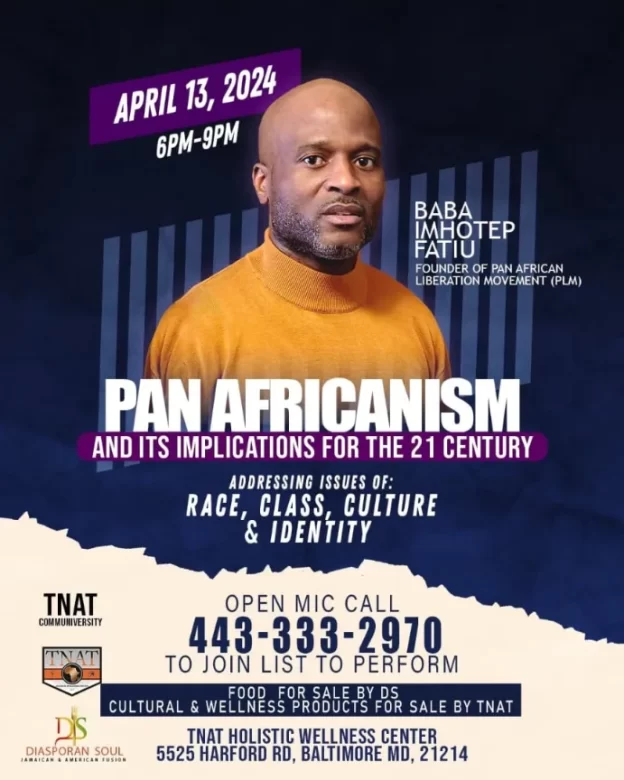
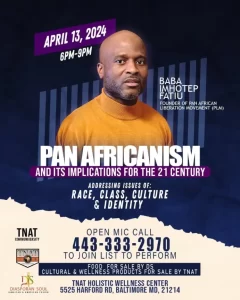 Baba Imhotep Fatiu, Founder of the Pan African Liberation Movement (PLM), will give this lecture to address issues of race, class, culture and identity from 6 pm – 9 pm at the Temple of New Afrikan Thought, 5525 Harford Road in East Baltimore.
Baba Imhotep Fatiu, Founder of the Pan African Liberation Movement (PLM), will give this lecture to address issues of race, class, culture and identity from 6 pm – 9 pm at the Temple of New Afrikan Thought, 5525 Harford Road in East Baltimore.